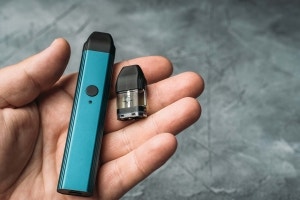What is the Difference Between CBD and Weed?
Some people still believe CBD is the same as cannabis/marijuana.

Despite having been around for several years now, some people are still unsure what the difference is between CBD and Marijuana (also known as Cannabis and Weed). CBD, or cannabidiol, is a naturally-occurring compound found in cannabis plants. But what’s the difference between CBD and Weed (also known as marijuana)? The answer lies in their key differences in chemical makeup, legality, and effects on the body.
What you should know about CBD
CBD is a compound derived from cannabis and hemp plants that has grown increasingly popular in the UK, EU and US for its potential therapeutic properties. It is non-addictive and does not create a high effect which means it does not produce any of the typical negative effects associated with marijuana or weed. Instead, CBD is believed to interact with the body’s endocannabinoid system to help promote balance in the body.
Studies have found that CBD may help with issues such as anxiety, pain relief, inflammation and more, but further research is necessary. At this time CBD is only legally allowed for retail as a supplement, cosmetic or vape product meaning that it should not be used to treat medical conditions or boast medical benefits.
CBD is a cannabinoid, one of the many cannabinoids found in hemp and cannabis plants, alongside THC. Also known as Tetrahydrocannabinol, it is one of the main compounds that gives cannabis or weed its notorious effects.

The Chemical Differences between CBD and THC
When it comes to the chemical differences between CBD and THC, perhaps the most obvious is that they produce different effects on the body. While THC is responsible for producing a ‘high’ feeling or intoxicating feeling; CBD does not. The important difference between CBD and THC is that CBD is non-euphoric. Technically, CBD is also a psychoactive compound, meaning it can affect the brain and produce a feeling of relaxation or calm. However, CBD is not known to produce any of the common psychoactive effects associated with THC.
The definition for 'psychoactive' is any compound that affects the functions of the nervous system and results in alternations to perception, mood, cognition or behaviour. Some more common examples of this you're more likely to be aware of are caffeine, nicotine and alcohol.
Largely, CBD's psychoactive effects are much more muted than THC as it doesn't bind to our CB1 receptors as THC does. This receptor, when met with THC, creates the euphoric feeling associated with cannabis and weed, and explains why CBD does not create the same sensation.
The legal differences between CBD and THC
In many countries, including the UK, CBD is legal as long as it contains no more than 0.2% THC (0.3% in the US). This means that CBD oil or other products containing only trace amounts of THC are now widely available and can be purchased without a prescription.
Marijuana or Weed is still illegal in the UK due to its high levels of THC. This means that products containing more than 0.2% THC are not legal and cannot be purchased without a prescription.
In some areas of the US, medical marijuana is becoming increasingly available for those who are prescribed it by a doctor. While these products may have higher amounts of THC than CBD products, they are still tightly regulated and can only be purchased from licensed dispensaries.
For anyone looking to purchase or use CBD oil or products, it’s important to ensure that they comply with the legal requirements in their country. This means checking labels and researching manufacturers to make sure their products contain no more than the legally allowed amount of THC. Trusted CBD brands like Cali Greens, should have laboratory testing to ensure THC levels in their products are at legal levels, with the results available for you to see.
You can find all of our lab test results for Cali Greens products here.

How the effects on the body differ between CBD and THC
Both CBD and THC interact with the body’s endocannabinoid system, but they do so in different ways. While THC binds to cannabinoid receptors and produces a psychoactive high, CBD does not produce this same effect. Instead, it potentially works to regulate activity in the endocannabinoid system.
The effects of CBD on the body are largely dependent on the individual which makes it hard for scientists to clarify CBD's benefits. But many people report feeling calmer and more relaxed after taking it. It is also believed to have anti-inflammatory properties, as well as being useful for managing anxiety and stress levels. Similarly, some people report little to no effects when taking CBD!
Should you be worried about trying CBD?
In conclusion, there are significant differences between CBD and Weed. While Weed contains THC which is responsible for producing the feeling of being 'high', CBD does not have this same effect as it binds to different receptors in the body. This means that anyone using legal CBD products containing zero THC or only trace amounts (less than 0.2%), should not worry about experiencing any psychoactive effects associated with cannabis or weed.











